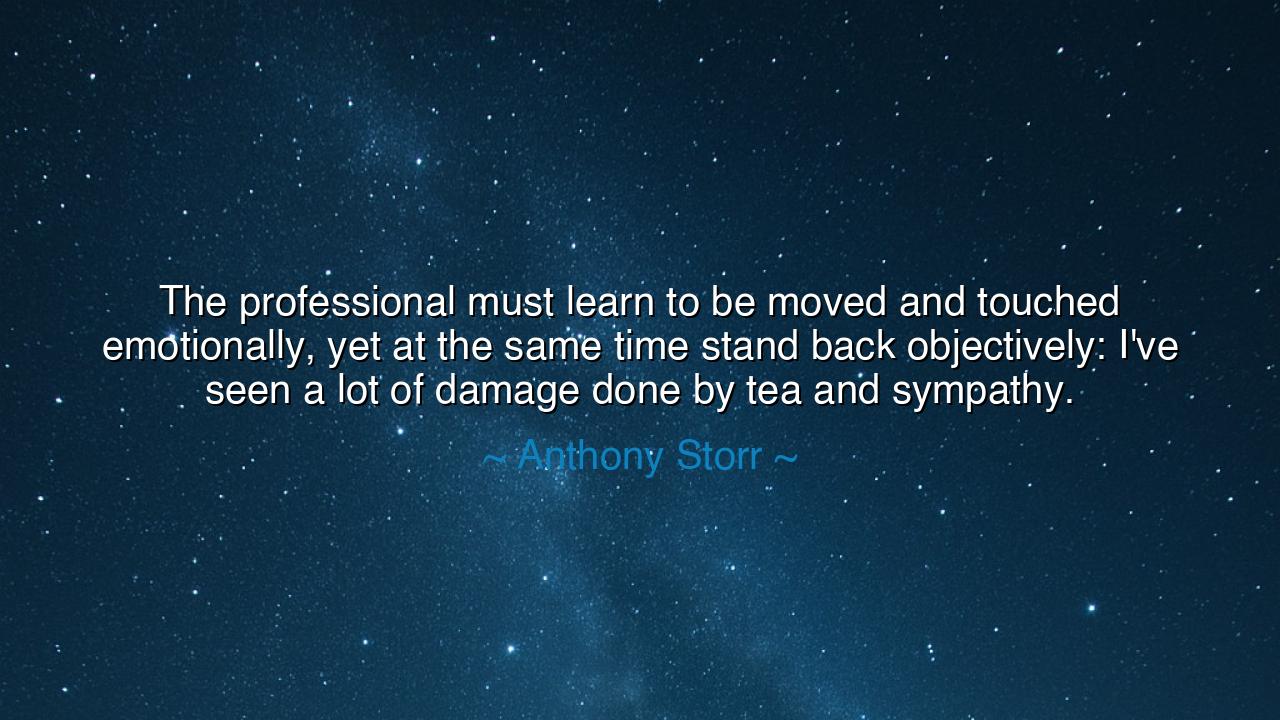
The professional must learn to be moved and touched emotionally
The professional must learn to be moved and touched emotionally, yet at the same time stand back objectively: I've seen a lot of damage done by tea and sympathy.






Hear the words of Anthony Storr, physician of the mind, whose wisdom pierced into the delicate balance between heart and judgment. He declared: “The professional must learn to be moved and touched emotionally, yet at the same time stand back objectively: I’ve seen a lot of damage done by tea and sympathy.” In this utterance, he reveals the paradox of the healer, the counselor, the guide: one must feel, but not drown; one must care, but not be consumed; one must stand near enough to touch another’s pain, yet far enough to bring clarity and strength.
When Storr speaks of the professional, he refers to those entrusted with the suffering of others—doctors, therapists, leaders, mentors. To fulfill their calling, they cannot harden their hearts; they must allow themselves to be moved, to feel the weight of human sorrow, to be stirred by the wounds they witness. Yet if they give only sympathy, if they fall wholly into the other’s pain, they risk becoming lost themselves. The phrase “tea and sympathy” carries this warning: comfort without structure, pity without wisdom, may soothe for a moment but does harm in the long span. It weakens, rather than strengthens, those who are already struggling.
The origin of these words lies in Storr’s work as a psychiatrist, where he saw firsthand how unchecked emotion could hinder healing. He observed that many well-meaning souls, seeking only to console, offered too much warmth and too little guidance. This kind of sympathy blurred boundaries, creating dependency instead of resilience. Storr knew that healing requires both tenderness and steel: tenderness to acknowledge pain, steel to help the sufferer rise above it. Without this balance, the professional becomes not a guide, but a companion in despair.
History shows us the truth of this balance. Consider Florence Nightingale in the Crimean War. She was deeply moved by the suffering of soldiers, walking the wards with her lamp, offering presence and comfort. Yet she did not allow herself to collapse into pity. Instead, she measured, calculated, organized, and reformed. Her empathy gave her the will to act, but her objectivity gave her the means to save lives. Had she offered only “tea and sympathy,” her name would not echo through history as the Lady with the Lamp, but as one who comforted without curing.
The deeper meaning of Storr’s words is this: to truly help others, we must master the union of feeling and distance. Without emotion, we become cold machines, unable to inspire trust or connection. Without objectivity, we become lost in the storm of another’s grief, powerless to guide them to calmer shores. True service requires walking the narrow bridge between these two forces, never straying too far to one side. It is a discipline, a daily act of courage, for it demands both compassion and restraint.
Beloved listener, take this lesson into your own life. When friends or loved ones come to you in pain, do not merely drown with them in sorrow, nor stand aloof and cold. Let your heart be touched, but let your mind remain clear. Offer kindness, yes, but also offer perspective. Ask yourself: Am I soothing them toward strength, or am I soothing them into weakness? This question will guard you against the errors Storr warned of.
Therefore, let your help be like a strong tree in a storm. Its branches may bend with the wind—that is your emotion—but its trunk remains firm—that is your objectivity. Be present, but be steady. Love others, but guide them wisely. For too much pity can bind, while true compassion liberates.
Thus the teaching of Anthony Storr endures: that the noble professional, and indeed any who would serve others, must cultivate the art of being both moved and measured. Sympathy alone may soothe for an hour, but the balance of heart and reason has the power to heal for a lifetime.






AAdministratorAdministrator
Welcome, honored guests. Please leave a comment, we will respond soon